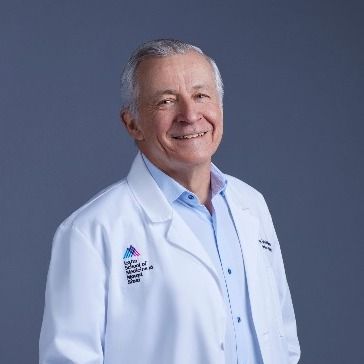Serotonin Syndrome Rates Low in Ozanimod Treated Ulcerative Colitis Patients
Hypertension rates were low in both ulcerative colitis and multiple sclerosis patients treated with ozanimod, regardless of concurrent SNRI/SSRI use.
Jean-Frederic Colombel, MD

New research shows patients with either ulcerative colitis (UC) or multiple sclerosis (MS) treated with concurrent ozanimod or selective serotonin reuptake inhibitors (SSRIs) and serotonin-norepinephrine reuptake inhibitors (SNRIs) are not at risk for serotonin syndrome.
A team, led by Jean-Frederic Colombel, MD, Icahn School of Medicine at Mount Sinai, examined the occurrence of serotonin syndrome and incidence of potentially related treatment-emergent adverse events during concomitant ozanimod and SSRI/SNRI use in studies involving patients with ulcerative colitis and multiple sclerosis.
The data was presented at the 2021 American College of Gastroenterology (ACG) Annual Meeting in Las Vegas.
The Drug
Ozanimod, an S1P receptor modulator, is currently approved for adults with relapsing forms of multiple sclerosis and moderately to severely active ulcerative colitis. The major active metabolites of the medication are monoamine oxidase (MAO) b inhibitors in vitro, which block metabolism of serotonin.
This leads to the possibility of increasing the risk of serotonin syndrome with the co-administration of ozanimod with serotonergic medications, including SSRIs and SNRIs.
Patients with both ulcerative colitis and multiple sclerosis are often treated with SSRIs because of the associated depression.
The Pooled Data
In the study, the investigators examined pooled data of studies patients with ulcerative colitis, as well as data from an open-label extension of patients with multiple sclerosis. Patients in both arms received ozanimod HCL 1 mg, which is the equivalent to ozanimod 0.92 mg.
The studies included 1158 patients evaluated in pooled ulcerative colitis studies, 62 of which with concomitant SSRI/SNRI and 2256 patients in the MS DAYBREAK study, 223 of which with concomitant SSRI/SNRI.
Patients included in the final analysis had at least 1 serious adverse events or at least 2 adverse events.
The mean ozanimod exposure was 22.1 months for patients in the ulcerative colitis studies and 34.9 months for patients in the multiple sclerosis study.
However, there were not any treatment-emergent adverse events found in matching the narrow search terms for serotonin syndrome. Matching broad search terms identified treatment-emergent adverse events as serotonergic or related to hypertension as low. The incidence rates were similar between the 2 groups, with or without concurrent ozanimod and ANRI/SSRI use.
“In these post hoc analyses of MS and UC studies, there were no reports of serotonin syndrome, neuroleptic malignant syndrome, or hyperthermia malignant, and the incidence of possible symptoms of serotonin syndrome was low regardless of concurrent SSRI/SNRI use in ozanimod-treated [patients],” the authors wrote.
The study, “Safety of Concurrent Administration of Ozanimod and Serotonergic Antidepressants in Patients With Ulcerative Colitis,” was published online by ACG.